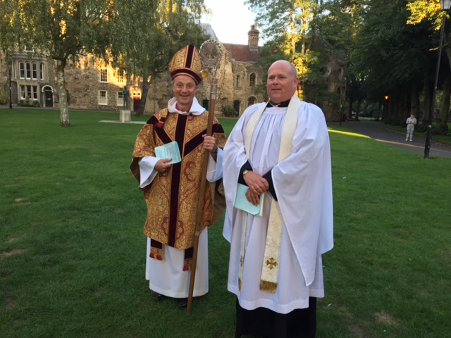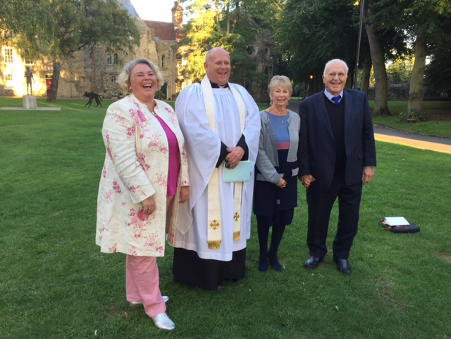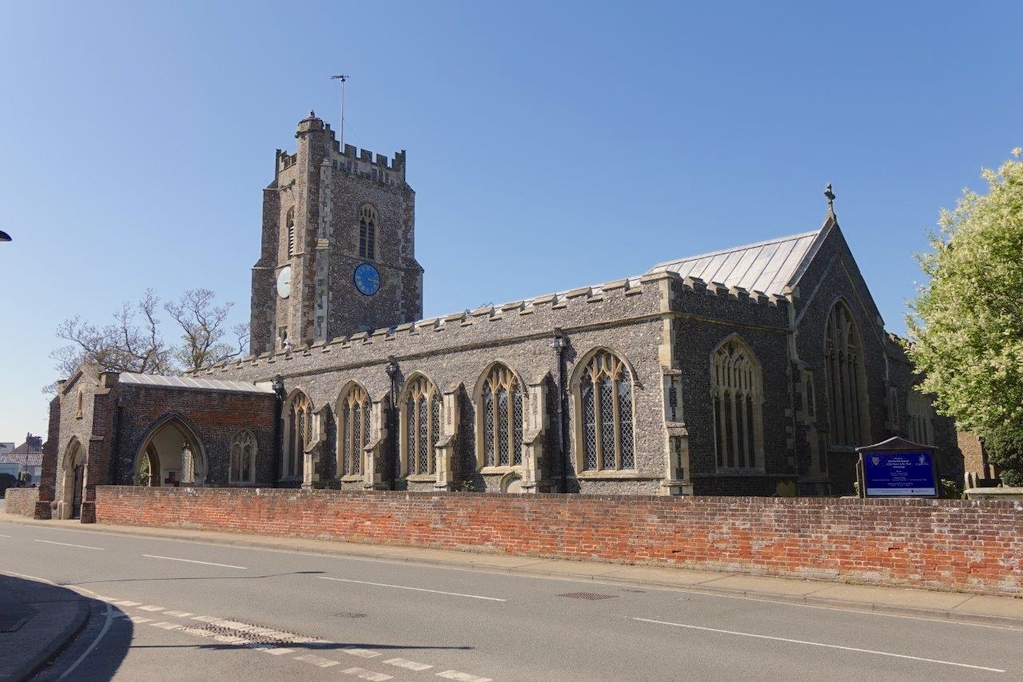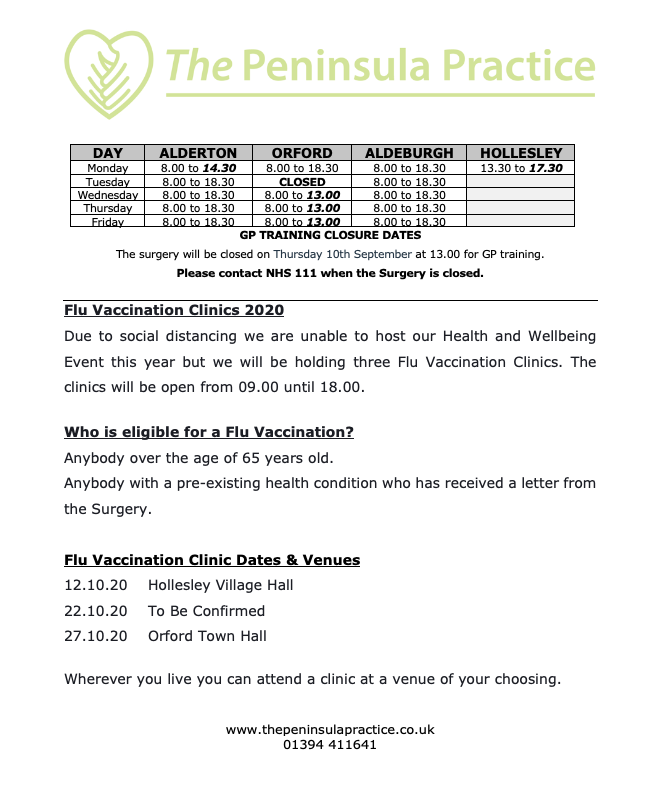|
||||||||||||||||
Message from the Rector
We had such a good service in Aldeburgh church last week. The church calendar may have said that it was only yet another ‘Sunday in Ordinary Time’ but it was far from ordinary for us. We brought the congregations of our four churches together, members of the choirs of Aldeburgh and Aldringham sang (thanks Mish), the organ sounded forth (thanks Andy) and James presided at a Holy Communion service for the first time. It was simply glorious. We presented James with some gifts – an icon of St James, something alcoholic and sparkling and when I next see him I will add another small gift that didn’t arrive in time – a mug bearing the words ‘Skilled enough to become a Priest, crazy enough to love it’. (!) Over the next few weeks James will be celebrating Holy Communion in each of our churches and you will all have the chance to celebrate with him. Congratulations James – it’s wonderful to have a new priest colleague. And I’ve added a couple of pictures that I took after James’s Ordination to the Priesthood on the 6th.
One of the notices that James read of at the beginning of the service related to the Suffolk Historic Churches Trust ‘Ride and Stride’ that was held last Saturday (12th). James passed on thanks to those present, but the thanks extend to all who rode, strode or even drove and also to everyone who manned one of our churches to clock the participants in. Despite all of the current difficulties it was a great success and, I know, enjoyed by many. The charity, and each of our churches, benefits and I would like to add my personal thanks to all involved.
And so, Ro and I head off on holiday. A reminder that there won’t be ‘home-made’ online services available during this time but there are plenty of other worship options out there to explore, beginning with our cathedral –
The Church of England itself provides a weekly service here:
https://www.churchofengland.org/more/media-centre/church-online/weekly-online-services
You will all be very much in my prayers while I’m away.
With love, as ever
Mark
James’s Ordination at St Edmundsbury Cathedral on
Sunday 6th September 2020 with Bishop Mike Harrison

Many Congratulations James

James with his Parents and Sister.
Collect
God, who in generous mercy sent the Holy Spirit upon your
Church in the burning fire of your love: grant that your people
may be fervent in the fellowship of the gospel that, always abiding
in you, they may be found steadfast in faith and active in service;
through Jesus Christ your Son our Lord, who is alive and reigns
with you, in the unity of the Holy Spirit, one God, now and for ever.
First Reading
Jonah 3.10-end of 4
When God saw what they did, how they turned from their evil ways, God changed his mind about the calamity that he had said he would bring upon them; and he did not do it.
But this was very displeasing to Jonah, and he became angry. He prayed to the Lord and said, ‘O Lord! Is not this what I said while I was still in my own country? That is why I fled to Tarshish at the beginning; for I knew that you are a gracious God and merciful, slow to anger, and abounding in steadfast love, and ready to relent from punishing. And now, O Lord, please take my life from me, for it is better for me to die than to live.’ And the Lord said, ‘Is it right for you to be angry?’ Then Jonah went out of the city and sat down east of the city and made a booth for himself there. He sat under it in the shade, waiting to see what would become of the city.
The Lord God appointed a bush, and made it come up over Jonah, to give shade over his head, to save him from his discomfort; so, Jonah was very happy about the bush. But when dawn came up the next day, God appointed a worm that attacked the bush, so that it withered.8When the sun rose, God prepared a sultry east wind, and the sun beat down on the head of Jonah so that he was faint and asked that he might die. He said, ‘It is better for me to die than to live.’
But God said to Jonah, ‘Is it right for you to be angry about the bush?’ And he said, ‘Yes, angry enough to die.’ Then the Lord said, ‘You are concerned about the bush, for which you did not labour and which you did not grow; it came into being in a night and perished in a night. And should I not be concerned about Nineveh, that great city, in which there are more than a hundred and twenty thousand people who do not know their right hand from their left, and also many animals?’
Second Reading
Philippians 1.21-end
For to me, living is Christ and dying is gain. If I am to live in the flesh, that means fruitful labour for me; and I do not know which I prefer. I am hard pressed between the two: my desire is to depart and be with Christ, for that is far better; but to remain in the flesh is more necessary for you. Since I am convinced of this, I know that I will remain and continue with all of you for your progress and joy in faith, so that I may share abundantly in your boasting in Christ Jesus when I come to you again.
Only, live your life in a manner worthy of the gospel of Christ, so that, whether I come and see you or am absent and hear about you, I will know that you are standing firm in one spirit, striving side by side with one mind for the faith of the gospel, and are in no way intimidated by your opponents. For them this is evidence of their destruction, but of your salvation. And this is God’s doing. For he has graciously granted you the privilege not only of believing in Christ, but of suffering for him as well— since you are having the same struggle that you saw I had and now hear that I still have.
Gospel Reading
Matthew 20.1-16
‘For the kingdom of heaven is like a landowner who went out early in the morning to hire labourers for his vineyard. After agreeing with the labourers for the usual daily wage, he sent them into his vineyard. When he went out about nine o’clock, he saw others standing idle in the marketplace; and he said to them, “You also go into the vineyard, and I will pay you whatever is right.” So they went. When he went out again about noon and about three o’clock, he did the same. And about five o’clock he went out and found others standing around; and he said to them, “Why are you standing here idle all day?” They said to him, “Because no one has hired us.” He said to them, “You also go into the vineyard.” When evening came, the owner of the vineyard said to his manager, “Call the labourers and give them their pay, beginning with the last and then going to the first.” When those hired about five o’clock came, each of them received the usual daily wage. Now when the first came, they thought they would receive more; but each of them also received the usual daily wage. And when they received it, they grumbled against the landowner, saying, “These last worked only one hour, and you have made them equal to us who have borne the burden of the day and the scorching heat.” But he replied to one of them, “Friend, I am doing you no wrong; did you not agree with me for the usual daily wage? Take what belongs to you and go; I choose to give to this last the same as I give to you. Am I not allowed to do what I choose with what belongs to me? Or are you envious because I am generous?” So the last will be first, and the first will be last.’
Sermon for the Fifteenth Sunday after Trinity
by The Revd Nichola Winter
Sometimes it seems that life simply isn’t fair. We work hard, we do what we perceive as our duty, we ‘get on with it’ – but bad things happen. All that effort but to no effect. And then we see others – ne’er-do-wells who seem to prosper, layabouts who thrive – it seems all wrong. We all expect a certain justice and it can be really irritating when it goes wrong.
The story of Jonah is one of my favourite bible stories (read the whole of the book – it’s short and it’s worth it!) – not least because at the outset Jonah doesn’t think much of the instruction from God – he sets off in completely the opposite direction. We know of his adventure with the whale – but then God gives him instructions a second time. Jonah carries them out this time – and perhaps we sense him thinking along the lines, ‘those Ninevehites – huh, they’ll get their comeuppance alright. My three-day journey round the city will be worth it.’ But Jonah has, unwittingly, accomplished God’s mission – he’s delivered his message and it has the desired effect as far as God is concerned – so God spares the people. But Jonah sulks. God again demonstrates his mercy – but also his power – to Jonah with the bush, but Jonah still really doesn’t get it. The somewhat open-ended conclusion of the story seems to hold up a mirror to our own lives – we, too, get hot under the collar on occasion – but are we really reacting in a way that demonstrates the compassion, love and mercy that God expects from us as His children?
This point is also made when Jesus likens the kingdom of heaven to the vineyard, managed by a generous landowner. When we accept God’s terms, who are we to criticise when God deals with others in a way that is different to the way in which he deals with us? In some respects, it’s really none of our business. God knows what we need; if we acknowledge our own relationship and concentrate on that, then what goes on between our neighbour and God is not something we need to know about. We must not be envious because God is generous. We each live our own life – our own story. If things don’t go the way we expect them to, we don’t need to consider it a failure or disappointment. At the Greenbelt festival one year, Rob Bell spoke about this – and he said, ‘God gives us a lamp in order for us to take the next step, not a powerful torch that illuminates everything in front of us.’ So, we need to stop worrying about measuring our success or failure against that of others. It’s not up to us to ration God’s love according to our own views as to how the world should be… but it is up to us to focus on the now; our own response to God in the present – in our own life.
As Reinhold Niebuhr wrote,
“Father, give us courage to change what must be altered, serenity to accept what cannot be helped, and the insight to know the one from the other.”
Post
Keep, O Lord, your Church, with your perpetual mercy; and,
because without you our human frailty cannot but fall, keep
us ever by your help from all things hurtful, and lead us to all
things profitable to our salvation; through Jesus Christ our Lord.
The Week Ahead – Next Sunday
27th September – Sixteenth Sunday after Trinity
|
9.45am |
Morning Praise |
Friston Church |
|
10.30am |
Holy Communion |
Aldeburgh Parish Church |
|
11.00am |
Informal Service |
Aldringham Churchyard |
|
Alan Bullard |

|
DAY |
ALDERTON |
ORFORD |
ALDEBURGH |
HOL |
|
Monday |
8.00 to 14.30 |
8.00 to 18.30 |
8.00 to 18.30 |
13.30 to 17.30 |
|
Tuesday |
8.00 to 18.30 |
CLOSED |
8.00 to 18.30 |
|
|
Wednesday |
8.00 to 18.30 |
8.00 to 13.00 |
8.00 to 18.30 |
|
|
Thursday |
8.00 to 18.30 |
8.00 to 13.00 |
8.00 to 18.30 |
|
|
Friday |
8.00 to 18.30 |
8.00 to 13.00 |
8.00 to 18.30 |
GP TRAINING & STAFF MEETING CLOSURE DATES
The surgery will be closed on Wednesday 7th October at 13.00 for GP training.
The Surgery will be closed between 14.00 & 16.00 on Thursday 15th October for a staff meeting.
Please contact NHS 111 when the Surgery is closed.
Flu Vaccination Clinics 2020
Due to social distancing we are unable to host our Health and Wellbeing Event this year but we will be holding three Flu Vaccination Clinics. The clinics will be open from 09.00 until 18.00 and by appointment only.
Who is eligible for a Flu Vaccination?
Anybody over the age of 65 years old.
Anybody with a pre-existing health condition who has received a letter from the Surgery.
Flu Vaccination Clinic Dates & Venues
12.10.20 Hollesley Village Hall
22.10.20 Aldeburgh Community & Sports Centre
27.10.20 Orford Town Hall
Wherever you live you can attend a clinic at a venue of your choosing.
Please call the surgery to book your appointment for the Flu Clinic.
www.thepeninsulapractice.co.uk
01394 411641
NOTICES
|
Food Banks at the East of England Co-op Foodbanks provide a valuable service to those in need in our communities and have an even more vital role to play as we navigate our way through these unprecedented times. The Aldeburgh Co-op and Solar in Leiston are doing a grand job in collecting food donations, which are collected regularly and distributed. |
|
Online services for 20th and 27th A reminder that there will be no online services from the Alde Sandlings Benefice on the 20th and 27th September, as Mark is on annual leave. However, please do visit the St Edmundsbury Cathedral Facebook page where online services are available. |
|
Ride and Stride Sponsors The ride and stride took place on the 12th September. It’s now time to pay that sponsor money. If you could please hand it to your parish representative (Fran Smith at Aldeburgh) or a member of clergy. Thank you so much for your support. |
|
Weekly Benefice Newsletter If you would like something added to the weekly newsletter that is relevant to the Benefice, please do let Claire know and we will do our best to include it the following week. Whether it be a story to tell, or tips or recipes or a notice to be added to spread the word. |













